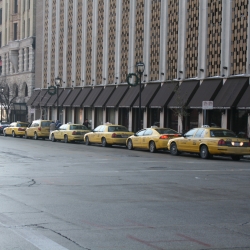Milwaukee’s Common Council Allows 100 More Taxis on City Streets
City responds to drivers’ court victory, but keeps unconstitutional cap on cabs. Lottery will determine who gets to go into business.
Milwaukee, Wis.—In direct response to a court case won last spring by the Institute for Justice on behalf of three Milwaukee taxi drivers, today the Milwaukee Common Council voted to add up to 100 cabs to the city’s streets. This will bring the number of cabs up to 420 and strikes a blow to the existing taxi cartel that has controlled the city’s taxi industry since the number of cabs was capped in 1991. The Council failed, however, to fully implement the court’s ruling and kept a cap on the number of taxicabs, defeating Alderman Michael Murphy’s proposed amendment to lift the cap entirely. That means just like the original cap, the new law violates the Wisconsin Constitution’s guarantees of equal protection and the right to earn an honest living. For that reason, this new cap may be struck down in court just as the former was.
The up to 100 new taxicab permits will be awarded in 2014, by lottery if there are more than 100 applications. Applicants cannot apply for more than two cab permits each, and current taxicab owners who own more than one cab are not eligible. Just like current cab permits, the new permits can be sold on the secondary market. When IJ filed its lawsuit against the city in 2011—the event that first triggered today’s reforms—permits were selling for approximately $150,000, more than the average price of a Milwaukee house.
“We welcome the addition of up to 100 cabs to Milwaukee’s streets,” said IJ Attorney Anthony Sanders. “My clients and other Milwaukee drivers, and the Institute for Justice are all very happy that our court victory has forced the city to finally begin to reform its command-and-control taxicab monopoly and that Milwaukee will get its first new cabs in more than 22 years. But, today’s action fails to fully implement the court’s ruling of this past spring, which clearly stated that a cap on tradable permits in a government-created cartel is unconstitutional.”
“I am happy that I may finally get my own cab if I win the city’s new lottery,” said Ghaleb Ibrahim, the lead plaintiff in IJ’s lawsuit. “But neither I nor any other driver should have to win a lottery to go into business. There should be no lottery on the American Dream. My fight will continue until all drivers are able to compete on equal terms without the city limiting how many of them can go into business.”
The addition of all 100 cabs would make the ratio of cabs to population about one cab for every 1,420 residents, better than the former one to 1,850 ratio. But, it is still far behind other major American cities. For example, Seattle has about one cab for every 940 residents, Denver one for every 480, and Washington, D.C., one for every 90. Obviously, Milwaukee still has a long way to go.
“Just as an engaged judge was needed to break the old cap, another may be needed to break the new one,” said IJ attorney Katelynn McBride. “We will closely monitor this situation and continue the fight until Milwaukee is free of artificial caps on who may—or may not—offer their services to its citizens.”
The Institute for Justice has helped open taxi markets in Denver, Indianapolis, Cincinnati and Minneapolis and for more than 20 years has been the nation’s leading legal advocate for the rights of entrepreneurs. For more on the lawsuit to open Milwaukee’s taxi market, visit www.ij.org/MKETaxis.
NOTE: This press release was submitted to Urban Milwaukee and was not written by an Urban Milwaukee writer. While it is believed to be reliable, Urban Milwaukee does not guarantee its accuracy or completeness.
Mentioned in This Press Release
Recent Press Releases by Institute for Justice
Transportation Freedom Wins in Federal Court
Oct 7th, 2016 by Institute for JusticeFederal Appeals Court: Taxis’ Claim to Medallions “Borders on the Absurd”
Taxi Owner-Drivers Officially Join Lawsuit to Stand Up for Transportation Freedom
Apr 15th, 2015 by Institute for JusticeCheema, Malik and IJ have asked the court to dismiss the cab companies’ lawsuit.
Milwaukee Taxi Owners Sue to Block New Law
Aug 25th, 2014 by Institute for JusticeIndependent taxi drivers and Institute for Justice attorneys promise vigorous defense























I want them to lift the cap completely and allow competition from start-ups like Uber and Lyft, but I have a question. I assume that there is some law that keeps this from happening, but why can’t a surrounding city like West Allis or Shorewood or Cudahy deregulate the taxi laws and have operations based there but conduct business throughout the city? It sure would be a nice income stream for them to take advantage of demand that is going unmet.
It looks like the city is still engaged in crony capitalism. The aldermen are merely increasing the number of permits rather than removing the cap. They are doing this to ensure that existing permit holders, primarily Sanfelippo family, still have some value in their permits. Few months ago, these aldermen were not even in the favor of increasing the cab permits by 50. They have changed their views a great deal based on court decision. The cap is still unconstitutional and wrong. Hopefully the legal system finally forces the city to get rid of the cab permit cap.
John, taxis licensed in a suburb like Shorewood probably would be legally unable to pick up anybody in the City of Milwaukee. They could take somebody from Shorewood to downtown, but then would be required to return (empty) to Shorewood. I also wonder about the legality of Uber and Lyft; just because nobody has cracked down on them yet doesn’t mean that they won’t in the future.
So, it’s more responsible to blow up the system and cab marketplace? What do you call that, creative destruction?
The common council’s goal should be to remove a cap on permits, I agree with you… sell them for $10,000/permit, allow their transfer for $10,000/permit.
You can’t responsibly make that happen overnight though.
@Tim I don’t believe the city would be legally allowed to charge $10,000 for the permit. Fees are limited to cost recovery.